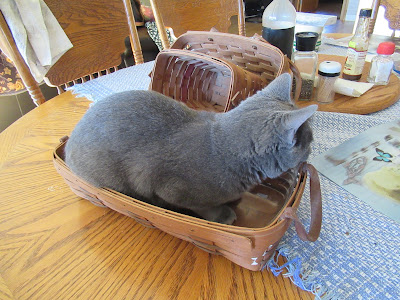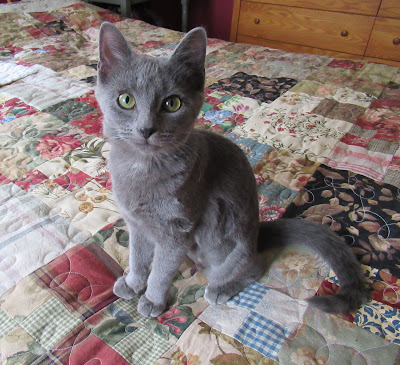Morning's Minion
Words Plucked from a Rag-Bag Mind.
Monday, June 30, 2025
Thimble-Kitten is Now A Cat!
Thursday, June 5, 2025
Garden Notes
Tuesday, June 3, 2025
The Raised Garden Bed Project
Friday, May 30, 2025
End of May
Sunday, May 25, 2025
Weather and Gardens
Wednesday, May 14, 2025
School Days; A Memoir; Final Installment
Students who were following the 'college course' expecting to continue education after high school graduation or chose instead a 'commercial course' had to travel out of town to one of the area 4 year high schools. My mother, Beulah Lewis Desjadon, had graduated from Brandon High School as Salutatorian and went from there to the two year teachers' training course then offered at Castleton Normal School [later Castleton College.] It was her hope and expectation that I would also prepare for a teaching career. By this time I had misgivings as to my suitability for teaching, but the college prep course offered the best options.
In earlier decades young people studying out of town had to board within walking distance of the high school of their choice, an added expense for parents. By the late 1950's and early 1960's the option was to find a ride to Brandon with an older student whose family had provided their recently licensed offspring with a car, or as happened for my sister and me, the opportunity to wait on the corner of Young RD and Rte 73 for a teacher who taught in the Brandon Elementary School.
In Brandon we were let out at the foot of the hill to trudge, book bags slapping at our hips, up the street to the three story brick building which was little changed since my Mother's school days.
The adjustment required for this transition wasn't as surprising as the earlier one although there was now the challenge of a different instructor for each class, bells ringing to signal the ending of a session, the march up and down stairs to the next classroom. Student traffic was marshaled in one direction: one's next scheduled class might be in the adjoining room, but to avoid traffic jams one merged with the throng thumping through halls and crowded staircases wheeling off when the designated room came in sight.
I was again in band—a marching band this time—and in chorus. My best friend from home, Linda, was there and I made casual friends among some of the other quiet girls, most of whom had come in from the outlying smaller towns.
The schedule was grueling; we had to be at the corner to catch our ride at 7:30, arriving home after 4 p.m. Supper, homework, bedtime and trying to fall asleep before midnight in preparation for doing it 5 days per week.
In 1961 Brandon High School joined the newly created Otter Valley Union District; Orwell assigned its students to Fair Haven Union High School. My senior year was spent there, my 4th school although I had never moved from home.
I was weary of school. The past two years of high school with the early morning commute, the long hours, had worn me down physically. I had ordered a few college catalogs, although I now recognized that college tuition would place a heavy strain on my parents. My pitiful scores in Algebra I and Plane Geometry had kept me from the Honor Roll so in spite of my high scores in subjects that required proficiency in reading and writing I was no candidate for a scholarship. I had also realized that I was not teacher material. I leaned toward the idea of becoming a librarian, but was surprised to learn that unlike the women who had served in that position in our small towns, to be considered for the job at any paying level required a college degree.
So, I was without plans for any scholastic future.
When I signed up for senior classes at Fair Haven I found I already had finished all the requirements to graduate there other than English IV. A schedule was made up for me: English IV; Latin II; Home Ec; Personal Typing, Speed Reading; Geography. Several of these classes were mainly populated by Juniors and Sophomores. The young man I would later marry sat in Geography class, as did my younger sister.
Fair Haven is a border town as are several of the towns in the union district. Many of the area students' grandparents and parents were Welsh, a few were Polish, families who had come to the US to work in the slate and marble quarries. It was a more 'blue collar' background with friendships and associations more recently formed. I knew most of the students on the high school bus, made connections with others who likewise were bussed in from surrounding towns.
I wasn't unhappy there but it felt like a rather plodding final year.
A few incidents stand out in memory. One happened as a result of English IV.
The teacher, Mrs. Margaret Onion, treated us [we were told] as we could expect to be treated if we went on to college. She was formidable! We read Beowulf, Canterbury Tales, Macbeth. We also took on Pygmalion which had been popularized as My Fair Lady.
Pygmalion was read aloud in class with the parts assigned on the spot. Mrs Onion called on me to read the part of the waifish and inelegant Eliza Doolittle.
I was horrified, the 'new girl' in class! After a moment of near panic I decided that if I must be Eliza I would do it with flair! I still have a recalled sense of satisfaction that I, the quiet little mouse, portrayed Eliza in a way that caught the attention of both teacher and classmates. As class dispersed at the sound of the bell, a girl I knew only by name approached me offering an invitation to join the Drama Club.
After school 'extra activities' would have meant catching the 'late bus' home. It would have meant endless rehearsal time. It would have meant eventual public performances something I couldn't have faced at that time.
I didn't volunteer to be a pianist for the chorus group rehearsals; a good friend from Orwell suggested it when the music instructor rose from the piano stating in frustration that she couldn't both direct effectively and play accompaniments. I was excused from other classes on music days to pound out tenor or alto parts for a learning session. I took home music scores so I could learn the more difficult piano accompaniments. I prayed for the good health of the girl who was the usual pianist for school concerts.
I graduated, not with honors due to my lack of proficiency in math, but placed respectably in the top third of the group.
I worked a summer job as I had since I was 16. Another job in a small local business saw me through the winter and spring. My Mother warned that I needed further education, 'something to fall back on' as she put it. Academically, in spite of my aversion to math, I was qualified to attend college. In terms of physical stamina and emotional maturity and discernment I suspect I would have been adrift in the college environment of the 1960's.
The subject background and the study habits I formed during elementary and high school have served me well. I am still often 'lost in a book' or in research of those subjects that interest me.
I'm still at my best and most comfortable in a small group of friends, family and acquaintances who enjoy the sharing of ideas, interests and knowledge.
School Days; A Memoir, Part Three
The teacher of a one-room school had to be versatile. There might be half a dozen or more children in one grade, only one or two in another; if some children had repeated or skipped a grade there might be no children in a particular class. All the classes and recitations had to be accommodated within a small space. The teacher not only needed to instruct in the basic learning skills but was expected to present something that resembled an 'art' class several times per month. Here the stash of Grade Teacher magazines came into play.
'Art class' usually consisted of a seasonal drawing traced from the magazine pages and handed out to all along with colored pencils and crayons. The magazine example was tacked up in full view and the idea was to replicate it. Originality wasn't encouraged. I learned this in 4th grade when the Friday afternoon subject was a basket filled with flowers. The example was a blue basket. I was familiar with the vintage baskets, homely brown, in use in my grandfather's house. That is how I colored my basket. When she collected the pictures which would be pinned to the bulletin board, Mrs, Disorda held my masterpiece at arm's length and scolded, 'Who would want an old brown basket? Couldn't you see that it was blue?'
During Mrs. Gray's tenure Mrs. Harriet Cushman came to teach art. The project I remember best was more 'craft' than art—we were earlier instructed to bring a small bowl from home. We then happily and messily tore strips of newspaper, dunked them in a basin of sloppy paste and formed the strips in layers around our bowls. These objects were set aside to dry until the next session when the hardened shells were gently tapped loose. I was pleased to see that my papier mache bowl was well shaped and sat firmly on its bottom. I blended a custom color from the poster paints, mixing brown and orange to create terra cotta. I embellished the painted bowl with a band of white surmounted by free-hand cat faces. I huffed to Mrs Gray when I discovered that several people 'copied' [clumsily I thought] my choice of color and decoration. She listened patiently, acknowledged my frustration and quietly replied, 'When someone copies what you've done, try to consider it a compliment. It means they like your work.' The little bowl sat on my bedroom shelf for a long time holding a collection of small oddments.
Mrs. Fairie Tyler Atwood taught music in the local schools for several years. She was a lovely young woman, slender with strawberry-blonde hair. I was familiar with her as she sometimes played the pipe organ at church or performed vocal solos. She also gave private piano instruction; Mother had taught me to read music and encouraged me through the first book of lessons before deciding I would benefit from further study with Mrs. Atwood. I looked forward to the afternoons when she would arrive at the Young School and yet I have little memory of her presentations. The most enjoyable times were when she was leading us through The Virginia Reel. Having explained something of the history of this frolicsome dance, she lined us up in facing rows to learn the steps while she played a lively tune on the violin.
Book Mobile
A wikipedia article states that bookmobiles were at the height of their popularity in mid-20th century.
The bookmobile that turned up several times per year in the driveway at Young School was a van fitted with shelves. It was driven by Miss Ball, a plain-faced woman with an engagingly toothy smile. She dressed for whatever she might encounter in the way of muddy or rutted dirt roads, wearing a sensible plain skirt or trousers, a tweed topcoat, with a red beret confining her short greying hair.
After making sure that our shoes were relatively free of mud we were allowed by grades into the tight space of the van. I think there was a limit on how many books each student could select. I loved to read, was happily working my way through the selections in the children's room of the town library. I chose books considered above my grade level and hoped that others would be selecting books that I would enjoy.
The classroom rule was that if assigned work was finished before the next class was called to recite or hand in papers, we could go to the bookshelves and choose a book. There was a sparse collection of books owned by the school and these were always available. By 4th grade I had read them several times over so was glad of additions from the book mobile. I remember a book of Greek and Roman Myths, several volumes of fairy tales suitable for inducing nightmares; a favorite was the story of a family who converted a one-room schoolhouse into a family dwelling.
Strangely, Mrs. Disorda sometimes scolded me for being 'lost in a book.'
Transitions
I don't recall anticipating the transfer to the Village School for 7th grade with any particular misgivings. The actuality was rather unsettling. After that first year at Young School when I had felt intimidated by discord created by the older boys, I had made my place in the small group setting and school terms meshed with my interests and activities outside of the school year.
I was acquainted from Sunday School with a number of children who were in my 7th and 8th grade classroom, but mere acquaintance didn't lead to automatic inclusion in the cliques that had been years in the making among the village kids. I was then----even as now----a quiet introvert without the striking looks or personality that enable one to burst into a group as a welcome addition. I was clumsily uninterested in athletics although I did later manage to join the squad of cheerleaders who cavorted about at the basketball games held in the old town hall.
During those early weeks in the new to me environment someone tagged me with the epithet 'stuck-up.' I still don't know why that characterization originated or how it gained any traction, but it did somewhat haunt my time at Orwell Village.
My interest in music provided a source of affirmation as I could sing in 'special' groups or duets for the Christmas and Spring concerts.
I played 2nd clarinet in the school band which was presided over by Mr. Richard Oxley. Mr. Oxley served as First Chair Trumpeter in the Vermont Symphony Orchestra and it was clear that our efforts often strained his patience. His personality seemed the epitome of artistic temperament. Repeated efforts at rehearsals to drill rhythm or pitch into the less musical of his band members left him wildly brandishing his baton, groping for a cigarette, running his fingers through already disordered hair. Invariably, on the evening of a school concert he imported two of his accomplished daughters, one with a French horn, the other with an already astonishing prowess as a trumpeter.













































